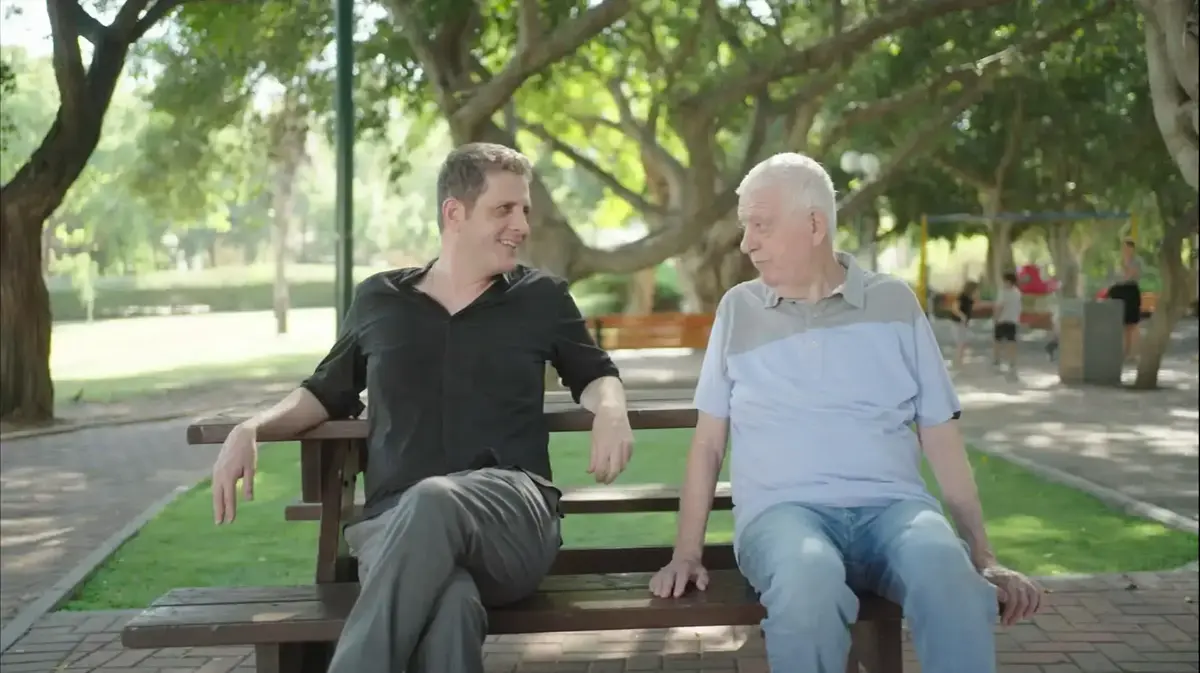Nir and Uzi Baram, from "Where Has the Left Gone?" (Photo: Hot8)
Is there a more well-worn question in Hebrew than what is the problem of the left?
The answer to this is probably negative.
One of the camp's favorite hobbies is discussing the question "where did we go wrong", turn by turn, development by development.
Since reality provides the Israeli left with more and more blows - and the results of the last election were a particularly painful one - so the discussion continues and never stops, like a kind of periodic ritual.
The last participant in this conversation is Nir Baram, a respected writer and the son of former minister Uzi Baram, a member of the Labor Party remembered from the days of the Rabin government.
In a new film entitled "Where Has the Left Gone?"
And it came up this week on Hot8, Baram asks, well, where has the left gone, through meetings with politicians, intellectuals and media and quite a few long-time friends, and self-reflection on his growing up years and shaping as a leftist, which coincided with the beautiful years of the peace camp.
In fact, much more than a political text, it's a film about coming of age - and that's also its best side.
More on that later.
Baram and A.
B.
Yehoshua, from "Where Has the Left Gone?" (Photo: Hot8)
Baram's thesis is this: the Labor Party was reborn in the Rabin era as the bearer of the flag of peace, reconciliation and the end of the Palestinian conflict - an era that ended in heartbreak in a chain of events that begins with Rabin's murder and continues with murderous terrorist attacks, Netanyahu's rise to power, Barak's no-partner speech, and finally the second intifada, which he claimed eliminated Thundered the hope for peace in the Israeli public.
In the 2000s, he continues, the Labor Party, which serves as the main representative of the "Israeli left" in the argument, raised a new flag - the flag of social justice, which was reflected in the era of Peretz, Yachimovich and the social protest.
Today, according to Baram, this ideal has been replaced by the "only not Bibi" ideology, which in his eyes is an empty and non-positive flag, based exclusively, as it were, on opposition to the right and in the name of which one can renounce traditional leftist values, and even, mercifully, take part in the government in partnership with bitter rivals, Like Naftali Bennett.
For him, this equates to the death of politics, and in any case to the death of the left as an irrelevant political force.
More in Walla!
It's time for Assi Cohen to take off Shaoli's wig, and start fighting for his art
To the full article
These are quite familiar arguments, which have been discussed at length in recent years on a variety of platforms, and it is hard to say that Baram's journey to renew them is anything unusual.
However, in my eyes, his starting point is wrong, because he reduces an entire movement to one flag and one channel of influence - parliamentary politics, while political activity is necessarily multidimensional, both in terms of content and in terms of the way.
The left, then and now, waves a multitude of flags: the end of the conflict, equality and social justice, workers' rights, minority rights, women's and LGBT rights, a welfare state, pluralism and freedom of art, to name a few. In some of these areas, for example women's and LGBT rights, The "disappearing left" has achieved enormous social achievements in recent decades.
In many cases, the Sepsis struggles against occupation or exploitative employment conditions - those flags disappear according to Baram - are almost never done through the Knesset but through diligent human rights organizations, which fight tooth and nail.
Those looking to fight for these flags have a host of addresses.
Finally, there is reason to wonder why the concept was established that "only not Bibi" is not an ideology, while the support for Netanyahu from the other side of the barrier is such.
The Netanyahu government identifies itself with values contrary to the above list, and his emerging government only exacerbates this.
Not only does opposition to them reflect the values of the left, but also the tens of thousands who came every Saturday to protest in Balfour prove the power of this flag.
The real question
It seems that maybe the main question is not presented correctly.
What Baram is asking is not "where has the left gone", but where have his contemporaries gone - the members of the candlelight youth generation, who grew up full of hope but raised their hands in the face of a rapidly changing world.
This is largely the story of many generations.
When Braam connects his personal story to it, it is the most beautiful part of the film.
He met with the deputy mayor of Ma'ale Adumim, who demonstrated under his house against the Oslo Accords in the 1990s;
with a right-wing girlfriend from high school;
With media person Ohad Hamo and researcher Avi Shilon, they are also longtime friends.
The reunion, which is always warm and human and at eye level, even when the sides of the fence are different, is the real added value of the film, which raises another question: not where has the left gone, but where has the ability to meet and talk with a smile and with mutual respect disappeared - and this is a question that should be asked in all political camps in Israel
culture
TV
direct watch
Tags
Nir Baram
Uzi Baram

